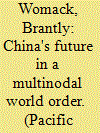|
|
|
Sort Order |
|
|
|
Items / Page
|
|
|
|
|
|
|
| Srl | Item |
| 1 |
ID:
180153


|
|
|
|
|
| Summary/Abstract |
Residential energy efficiency is a core element of the decarbonisation policy in many nations. In the UK, the established approach to enabling efficiency gains through centralised retrofitting programmes involves socialising costs via consumer energy bills through the Energy Company Obligation (ECO). One UK policy concern is whether less affluent households should receive greater access to ECO funding. However, there is a broader concern that the use of constrained public resources should be justified through wider and sustained economic returns emerging. Here, we consider the (centralised) ECO approach to cost recovery alongside alternative (decentralised) approaches to delivering energy efficiency programmes that either pass costs to beneficiary households or fully socialise costs via income tax. We find the key drivers of both household and wider economy outcomes are the absolute levels of resources actually devoted to enabling efficiency gains and household disposable income freed up to power expansionary processes. The latter in particular brings challenges and trade-offs in terms of meeting both economic performance and social policy objectives, given that resources targeted at higher income households can ultimately free up more real spending ability and sustain greater gains in GDP, employment and household incomes.
|
|
|
|
|
|
|
|
|
|
|
|
|
|
|
|
| 2 |
ID:
131065


|
|
|
|
|
| Publication |
2014.
|
| Summary/Abstract |
Over the next twenty years China is likely to become the world's largest national economy, though not the richest one-fifth of the world's population. Chinese demographic power will be qualitatively different from American technological power despite bottom-line similarities in GNP, and China will face challenges of political and economic sustainability. Assuming that globalization, constrained state sovereignty, and demographic revolution continue as basic world trends, the world order is likely to be one in which concerns about conflicts of interests drive interactions, but no state or group of states is capable of benefitting from unilaterally enforcing its will against the rest. Thus, there is no set of "poles" whose competition or cooperation determines the world order, despite the differences of exposure created by disparities in capacity. Although the United States and China will be the primary state actors and their relationship will contain elements of rivalry as well as cooperation, the prerequisites of Cold War bipolarity no longer exist. Rather, the order would be best described as "multinodal," a matrix of interacting, unequal units that pursue their own interests within a stable array of national units and an increasing routinization of international regimes and interpenetrating transnational connections
|
|
|
|
|
|
|
|
|
|
|
|
|
|
|
|
| 3 |
ID:
137698


|
|
|
|
|
| Summary/Abstract |
Forward-looking approaches to fiscal sustainability generally assess the fiscal implications of future programme-specific expenditure. This article attempts to assess the future fiscal implications of the National Food Security Act (NFSA), 2013, for the Indian economy. The results, under the baseline scenario based on the projected debt–GDP ratio, indicate a modest increase till 2021–22 and then debt/GDP declines towards the current level of 70% in 2012–13, signifying fiscal sustainability. The dynamics of the projected baseline debt–GDP ratio are largely shaped by the provisions of the Act and underlying demographic factors during the projection horizon. Sensitivity analysis under different assumptions about productivity growth, the interest on government borrowing and primary deficit–GDP ratios show mixed results and hence provide necessary policy pointers towards restoring fiscal sustainability under the Act. Keeping the primary deficit–GDP ratio below 1.5 per cent through periodic upwards revisions in the issue price of food grains, as envisaged in the Act, coupled with higher productivity growth and lower interest on government debt, would ensure long-term fiscal sustainability of the Act.
JEL Classification: H24, H62, H68, J11, Q18
|
|
|
|
|
|
|
|
|
|
|
|
|
|
|
|
| 4 |
ID:
167003


|
|
|
|
|
| Summary/Abstract |
A major challenge facing humans in the 21st century is how to strike a balance between the mitigation of environmental degradation and the achievement of sustainable economic growth. On this note, this investigation applies an autoregressive distributed lag (ARDL) methodology to a panel data of 28 European Union (EU-28) countries over the period 1995–2015. The study confirms the existence of positive and significant long-run nexus among environmental sustainability, renewable energy consumption and economic growth in the EU-28 countries. In addition, empirical results indicate that real gross fixed capital formation, carbon emissions and other environmental factors are principal determinants of long-run growth in the EU. Using Dumitrescu and Hurlin (2012) Granger non-causality in heterogeneous panel, results show long-run bidirectional causal relationships among renewable energy consumption, economic growth and other growth determinants. Based on these results, we infer that the exploitation of renewable energy sources in the EU-28 countries is a reliable pathway toward environmental pollution mitigation. Consequently, achieving sustainable development goals (SDGs) by the year 2030 through renewable energy consumption and carbon emission mitigation is very much achievable in the EU-28 countries, and should also be adopted by all countries as an effective global policy.
|
|
|
|
|
|
|
|
|
|
|
|
|
|
|
|
|
|
|
|
|